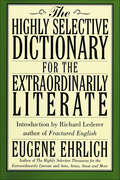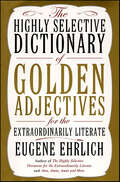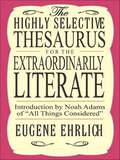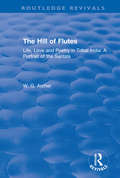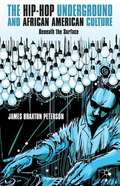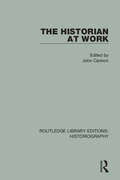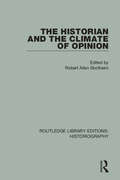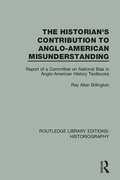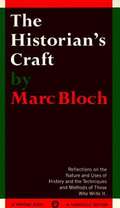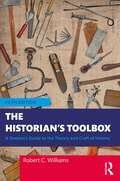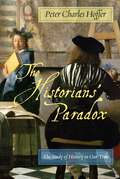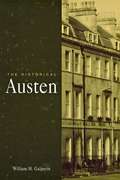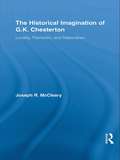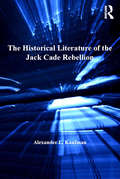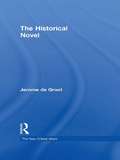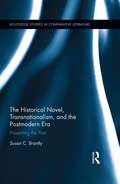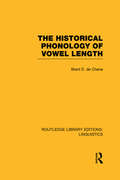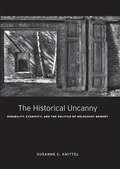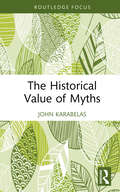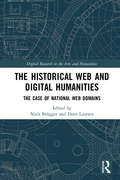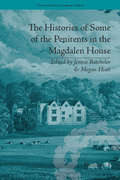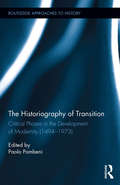- Table View
- List View
The Highest Apple: Sappho and the Lesbian Poetic Tradition (Sapphic Classic)
by Judy GrahnIn 1985, Judy Grahn boldly declared that lesbians have a poetic tradition and mapped it from Sappho to the present day in the groundbreaking book The Highest Apple. With her characteristic ferocious intellect, passion for historical research, careful close readings, and dynamic storytelling, Grahn situated poetry by Sappho, Emily Dickinson, Amy Lowell, H.D., Gertrude Stein, Adrienne Rich Paula Gunn Allen, Audre Lorde, Pat Parker, and Olga Bromas as central to lesbian culture-and more radically as central to society as a whole.In this new and updated edition of The Highest Apple: Sappho and the Lesbian Poetic Tradition, Grahn revisits the original text and amplifies it with a more in depth consideration of Pat Parker and in conversation with two younger lesbian poets, Alicia Mountain and Alyse Knorr, demonstrating the continued relevance and dynamism of The Highest Apple. A new introduction by Grahn and six responses by contemporary poets Donika Kelly, Kim Shuck, Serena Chopra, Zoe Tuck, Saretta Morgan, and Khadijah Queen highlight the ongoing significance of The Highest Apple to readers, writers, and thinkers.
The Highly Selective Dictionary for the Extraordinarily Literate (Highly Selective Reference)
by Eugene EhrlichBetween TV talk shows, radio call-in programs, email and the Internet, spontaneous-talk media has skyrocketed in the '90s. People are interacting more frequently and more fervently than ever before, turning the English language into an indecipherable mess. Now, this unique and concise compendium presents the most confused and misused words in the language today -- words misused by careless speakers and writers everywhere. It defines, discerns and distinguishes the finer points of sense and meaning. Was it fortuitous or only fortunate? Are you trying to remember, or more fully recollect? Is he uninterested or disinterested? Is it healthful or healthy, regretful or regrettable, notorious or infamous? The answers to these and many more fascinating etymological questions can be found within the pages of this invaluable (or is it valuable?) reference.
The Highly Selective Dictionary of Golden Adjectives: For the Extraordinarily Literate (Highly Selective Reference)
by Eugene EhrlichAdjectives have long suffered from bad press. For many years, English teachers have been fond of telling students that "adjectives are the enemy of nouns, and adverbs are the enemy of everything else."While it's still advisable to heed your English teacher's advice on most other matters, The Highly Selective Dictionary of Golden Adjectives for the Extraordinarily Literate proves that breaking certain rules can make written and spoken language that much livelier, adding much-needed color, style, and adornment. With this addition to the popular Highly Selective series, the "golden" adjective, at last, gets the star treatment it deserves. From adventitious to zaftig, renowned lexicographer Eugene Ehrlich has collected more than 850 of the most interesting and engaging adjectives in the English language and has provided concise definitions and instructive usage examples. Whether you're a writer, a speaker, or a word buff, this compendious, trenchant, laudable, and all-around fantabulous volume will help you put panache back into your prose.
The Highly Selective Thesaurus for the Extraordinarily Literate (Highly Selective Reference)
by Eugene EhrlichAnyone looking to improve his or her vocabulary and anyone who loves words will be enthralled by this unique and impressive thesaurus that provides only the most unusual -- or is it recondite? --words for each entry.
The Hill of Flutes: Life, Love and Poetry in Tribal India: A Portrait of the Santals (Routledge Revivals)
by W.G. ArcherOriginally published in 1974, The Hill of Flutes, is a descriptive account of the Santals and their poetry in their heartland of the Santal Parganas. The book explores the Santal world view, including approaches to education, love, sex, and marriage. It describes and discusses Santal dances, festivals and ceremonies, and other key events and gatherings, such as annual hunts. Through the close consideration of song and poetry, The Hills of Flutes offers an engaging insight into life in Santal society.
The Hip-hop Underground And African American Culture
by James Braxton PetersonThe underground is a multi-faceted concept in African American culture. Peterson uses Richard Wright, KRS-One, Thelonius Monk, and the tradition of the Underground Railroad to explore the manifestations and the attributes of the underground within the context of a more panoramic picture of African American expressivity within hip-hop.
The Hispanic World and American Intellectual Life, 1820–1880 (Studies of the Americas)
by Iván JaksićThis book examines why several American literary and intellectual icons became pioneering scholars of the Hispanic world after Independence and the War 1812. At this crucial time for the young republic, these gifted Americans found inspiration in an unlikely place: the collapsing Spanish empire and used it to shape their own country's identity.
The Historian At Work (Routledge Library Editions: Historiography #10)
by John CannonThis volume, originally published in 1980 discusses the way in which distinguished historians such as Gibbon, Ranke, Macaulay, De Tocqueville, Marx, Maitland, Bloch, Namier, Wheeler, Butterfield and Braudel have regarded and tackled their discipline. As well as chapters by individual authors who are experts on their chosen historian, there is a substantial introduction by the editor which serves as the basis for a discussion about the problems involved in the writing of history.
The Historian and the Climate of Opinion (Routledge Library Editions: Historiography)
by Robert Allen SkotheimThis volume of writings by outstanding twentieth-cnetury American historians presents one aspect of the problem which results from the conflict between the subjectivity of the historian and the objectivity of the past. It examines in particular the relationship between the historian and the climate of opinion in which he does he work.
The Historian's Contribution to Anglo-American Misunderstanding: Report of a Committee on National Bias in Anglo-American History Text Books (Routledge Library Editions: Historiography #3)
by Ray Allen BillingtonThis book examines text books used in English and American schools and determines the way in which national bias has been instilled into school children by the use of history books. This study reveals that the deliberate distortion common a generation ago has disappeared, but has been displaced by a more subtle form of bias that is more dangerous because it is less easily recognised. It deals in particular with the treatment of the American War of Indepdendence, the War of 1812 and World War I. The report contains positive suggestions to authors and publishers designed to eliminate all bias and to help them achieve historical objectivity.
The Historian's Craft: Reflections on the Nature and Uses of History and the Techniques and Methods of Those Who Write It
by Marc BlochThis work, by the co-founder of the "Annales School" deals with the uses and methods of history. It is useful for students of history, teachers of historiography and all those interested in the writings of the Annales school.
The Historian's Toolbox: A Student's Guide to the Theory and Craft of History
by Robert C. WilliamsNow in its fifth edition, The Historian’s Toolbox is designed to help students become skilled in the intellectual process and craft of history, offering an overview of the field and techniques for reading and writing about history.The fifth edition expands the selection of tools available to students entering the workshop of history. These include new chapters on digital history, Indigenous peoples, and gender history and new sections on the Voynich manuscript, LGBTQ+ history, slavery, and a historian who survived the war in Ukraine. The book has been fully updated to address the possibilities and limits of computerized approaches to doing history, with careful attention paid to the benefits and controversies of artificial intelligence, chatbots, and the internet. It demonstrates the continuing relevance of history in a cacophonous world of misinformation and censorship, emphasizing critical thinking, facts, and evidence as valuable means of understanding the past and shaping the future.Engaging and accessible, this volume is ideal for undergraduate courses in historiography and historical methods.
The Historians’ Paradox: The Study of History in Our Time
by Peter Charles HofferHoffer argues for a new methodological philosophy of history that mitigates fallibility and paradoxHow do we know what happened in the past? We cannot go back, and no amount of historical data can enable us to understand with absolute certainty what life was like “then.” It is easy to demolish the very idea of historical knowing, but it is impossible to demolish the importance of historical knowing. In an age of cable television pundits and anonymous bloggers dueling over history, the value of owning history increases at the same time as our confidence in history as a way of knowing crumbles. Historical knowledge thus presents a paradox—the more it is required, the less reliable it has become. To reconcile this paradox—that history is impossible but necessary—Peter Charles Hoffer proposes a practical, workable philosophy of history for our times, one that is robust and realistic, and that speaks to anyone who reads, writes and teaches history.Covering a sweeping range of philosophies (from ancient history to game theory), methodological approaches to writing history, and the advantages and disadvantages of different strategies of argument, Hoffer constructs a philosophy of history that is reasonable, free of fallacy, and supported by appropriate evidence that is itself tenable.
The Historical Austen
by William H. GalperinSelected by Choice magazine as an Outstanding Academic TitleJane Austen, arguably the most beloved of all English novelists, has been regarded both as a feminist ahead of her time and as a social conservative whose satiric comedies work to regulate rather than to liberate. Such viewpoints, however, do not take sufficient stock of the historical Austen, whose writings, as William Galperin shows, were more properly oppositional rather than either disciplinary or subversive.Reading the history of her novels' reception through other histories--literary, aesthetic, and social--The Historical Austen is a major reassessment of Jane Austen's achievement as well as a corrective to the historical Austen that abides in literary scholarship. In contrast to interpretations that stress the conservative aspects of the realistic tradition that Austen helped to codify, Galperin takes his lead from Austen's contemporaries, who were struck by her detailed attention to the dynamism of everyday life. Noting how the very act of reading demarcates an horizon of possibility at variance with the imperatives of plot and narrative authority, The Historical Austen sees Austen's development as operating in two registers. Although her writings appear to serve the interests of probability in representing "things as they are," they remain, as her contemporaries dubbed them, histories of the present, where reality and the prospect of change are continually intertwined.In a series of readings of the six completed novels, in addition to the epistolary Lady Susan and the uncompleted Sanditon, Galperin offers startling new interpretations of these texts, demonstrating the extraordinary awareness that Austen maintained not only with respect to her narrative practice--notably, free indirect discourse--but also with attention to the novel's function as a social and political instrument.
The Historical Imagination of G.K. Chesterton: Locality, Patriotism, and Nationalism (Studies in Major Literary Authors)
by Joseph R. McClearyThis study examines a selection of Chesterton’s novels, poetry, and literary criticism and outlines the distinctive philosophy of history that emerges from these writings. Looking at Chesteron's relationship with and influence upon authors including William Cobbett, Sir Walter Scott, Belloc, Shaw, H.G. Wells, Christopher Dawson, Evelyn Waugh, and Marshall McLuhan, McCleary contends that Chesterton’s recurring use of the themes of locality, patriotism, and nationalism embodies a distinctive understanding of what gives history its coherence. The study concludes that Chesterton’s emphasis on locality is the hallmark of his historical philosophy in that it blends the concepts of free will, specificity, and creatureliness which he uses to make sense of history.
The Historical Literature of the Jack Cade Rebellion
by Alexander L. KaufmanAccounts of Jack Cade's 1450 Rebellion-an uprising of some 30,000 middle-class citizens, protesting Henry VI's policies, and resulting in hundreds of deaths as well as the leaders' execution-form the dominant entry in a group of quasi-historical documents referred to as the London chronicles of the Fifteenth Century. However, each chronicle is inherently different and highly subjective. In the first study of the primary documents related to the Cade Rebellion, Alexander L. Kaufman shows that the chroniclers produced multiple representations of the event rather than a single, unified narrative. Aided by contemporary theories of historiography and historical representation, Kaufman scrutinizes the differing representations and distinguishes the writers' objectiveness, their underrated literary skills, and their ideological positions on the rebellion and fifteenth-century politics. He demonstrates how the use of figurative language is related to writing about trauma, and how descriptions of Cade's procession through London are a violent parody of midsummer festivals. In an exploration of authenticity in the descriptions of Cade, Kaufman also examines the characterization and plot devices that push Cade towards the realm of myth, showing that representations of Cade are influenced by popular fifteenth-century stories of Robin Hood.
The Historical Novel (The New Critical Idiom)
by Jerome De GrootThe historical novel is an enduringly popular genre that raises crucial questions about key literary concepts, fact and fiction, identity, history, reading, and writing. In this comprehensive, focused guide, Jerome de Groot offers an accessible introduction to the genre and critical debates that surround it, including: the development of the historical novel from early eighteenth-century works through to postmodern and contemporary historical fiction different genres, such as sensational or ‘low’ fiction, crime novels, literary works, counterfactual writing and related issues of audience, value, and authenticity the many functions of historical fiction, particularly the challenges it poses to accepted histories and postmodern questioning of ‘grand narratives’ the relationship of the historical novel to the wider cultural sphere with reference to historical theory, the internet, television, and film key theoretical concepts such as the authentic fallacy, postcolonialism, Marxism, queer and feminist reading. Drawing on a wide range of examples from across the centuries and around the globe The Historical Novel is essential reading for students exploring the interface of history and fiction.
The Historical Novel, Transnationalism, and the Postmodern Era: Presenting the Past (Routledge Studies in Comparative Literature)
by Susan BrantlyThis volume explores the genre of the historical novel and the variety of ways in which writers choose to represent the past. How does an author’s nationality or gender impact their artistic choices? To what extent can historical novels appeal to a transnational audience? This study demonstrates how histories can communicate across national borders, often by invoking or deconstructing the very notion of nationhood. Furthermore, it traces how the concerns of the postmodern era, such as postmodern critiques of historiography, colonialism, identity, and the Enlightenment, have impacted the genre of the historical novel, and shows this impact has not been uniform throughout Western culture. Not all historical novels written during the postmodern era are postmodern. The historical novel as a genre occupies a problematic, yet significant space in Cold War literary currents, torn between claims of authenticity and the impossibility of accessing the past. Historical novels from England, America, Germany, and France are compared and contrasted with historical novels from Sweden, testing a variety of theoretical perspectives in the process. This pitting of a center against a periphery serves to highlight traits that historical novels from the West have in common, but also how they differ. The historical novel is not just a local, regional phenomenon, but has become, during the postmodern era, a transnational tool for exploring how we should think of nations and nationalism and what a society should, or should not, look like.
The Historical Phonology of Vowel Length (Routledge Library Editions: Linguistics)
by Brent de CheneData from a variety of languages are offered in support of the claim that although there are several processes by which languages commonly add to an already existing stock of long vowels, there is only one mechanism by which a language without a distinction of vocalic length commonly introduces such a distinction. This mechanism is the coalescence of vowel sequences, typically after loss of intervocalic consonants. This book examines vowels lengths, their differences and their effects on language.
The Historical Renaissance: New Essays on Tudor and Stuart Literature
by Heather Dubrow Richard SprierInciteful essays with substantial bibliographies.
The Historical Uncanny: Disability, Ethnicity, and the Politics of Holocaust Memory
by Susanne C. KnittelThe Historical Uncanny explores how certain memories become inscribed into the heritage of a country or region while others are suppressed or forgotten. In response to the erasure of historical memories that discomfit a public’s self-understanding, this book proposes the historical uncanny as that which resists reification precisely because it cannot be assimilated to dominant discourses of commemoration.Focusing on the problems of representation and reception, the book explores memorials for two marginalized aspects of Holocaust: the Nazi euthanasia program directed against the mentally ill and disabled and the Fascist persecution of Slovenes, Croats, and Jews in and around Trieste. Reading these memorials together with literary and artistic texts, Knittel redefines “sites of memory” as assemblages of cultural artifacts and discourses that accumulate over time; they emerge as a physical and a cultural space that is continually redefined, rewritten, and re-presented.In bringing perspectives from disability studies and postcolonialism to the question of memory, Knittel unsettles our understanding of the Holocaust and its place in the culture of contemporary Europe.
The Historical Value of Myths
by John KarabelasThis book explores the connection between history and mythology by engaging with myths not as allegories or falsehoods, but as representations of historical experience. Historical approaches to myth are often absent from discussions of mythology, which favour symbolic and psychological interpretations. This analysis traces certain episodes of myths’ complex ancestries, from when their relationship with history could not so easily be severed, to subsequent attempts, which misunderstood myths as confused, undeveloped lenses for humanity to view the world. Drawing on the works of English philosopher R.G. Collingwood and the Romanticism movement, the book argues for the expansion of methodological approaches to myths. It explores the ways in which myths have served as clues for the history of civilization and humanity’s ever-changing complexities. The Historical Value of Myths is an illuminating read for advanced undergraduates, postgraduates, and researchers in the fields of mythology, the philosophy of history, and anthropology.
The Historical Web and Digital Humanities: The Case of National Web Domains (Digital Research in the Arts and Humanities)
by Niels Brügger Ditte LaursenThe Historical Web and Digital Humanities fosters discussions between the Digital Humanities and web archive studies by focussing on one of the largest entities of the web, namely national and transnational web domains such as the British, French, or European web. <P><P>With a view to investigating whether, and how, web studies and web historiography can inform and contribute to the Digital Humanities, this volume contains a number of case studies and methodological and theoretical discussions that both illustrate the potential of studying the web, in this case national web domains, and provide an insight into the challenges associated with doing so. Commentary on and possible solutions to these challenges are debated within the chapters and each one contributes in its own way to a web history in the making that acknowledges the specificities of the archived web. <P><P>The Historical Web and Digital Humanities will be essential reading for those with an interest in how the past of the web can be studied, as well as how Big Data approaches can be applied to the archived web. As a result, this volume will appeal to academics and students working and studying in the fields of Digital Humanities, internet and media studies, history, cultural studies, and communication.
The Histories of Some of the Penitents in the Magdalen House (Chawton House Library: Women's Novels)
by Jennie Batchelor Megan HiattFirst published in 1759, this novel aims to promote the cause of the Magdalen House, a charity which sought to rehabilitate prostitutes by fitting them for a life of virtuous industry. It challenges long-standing prejudices against prostitutes by presenting them as victims of inadequate education, male libertinism and sexual double standards.
The Historiography of Transition: Critical Phases in the Development of Modernity (1494-1973) (Routledge Approaches to History)
by Paolo PombeniDefining a “historic transition” means understanding how the complex system of intellectual, social, and material structures formed that determined the transition from a certain “universe” to a “new universe,” where the old explanations were radically rethought. In this book, a group of historians with specializations ranging from the sixteenth to the twentieth centuries and across political, religious, and social fields, attempt a reinterpretation of “modernity” as the new “Axial Age.”

